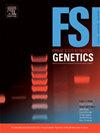Informed consent for forensic genetic population studies: Status quo and a call for harmonization
IF 3.1
2区 医学
Q2 GENETICS & HEREDITY
引用次数: 0
Abstract
Donor-signed informed consent is a fundamental prerequisite for ethically correct analysis and publication of genetic data in forensic population studies, including quality assessment of datasets and their inclusion into frequency databases. While considerations on the requirement and content of informed consent have been published, little information is available with regard to the actual nature of the documents currently in use. This study investigated 50 recent informed consent forms submitted to EMPOP and STRidER from a broad range of contributors across worldwide legislations, irrespective of the quality of the associated genetic data. The common ground of the informed consent forms, their specific content and differences, and the extent to which they contain suggested components are outlined. This evaluation of authentic informed consent form diversity adds to the discussion on formal aspects to be covered at the time of sampling and may expedite future harmonization of informed consent in forensic population studies, assuring ethical principles in the application of precious sample sets for a broad range of investigations across genetic disciplines.
法医遗传种群研究的知情同意:现状和协调的呼吁
捐助者签署的知情同意是法医人口研究中对遗传数据进行合乎道德的分析和发表的基本先决条件,包括对数据集进行质量评估并将其纳入频率数据库。虽然已经公布了关于知情同意的要求和内容的考虑,但关于目前使用的文件的实际性质的资料很少。本研究调查了最近提交给EMPOP和STRidER的50份知情同意书,这些同意书来自世界各地立法机构的广泛贡献者,而不考虑相关遗传数据的质量。概述了知情同意书的共同点、具体内容和差异,以及它们包含建议组成部分的程度。这种对真实知情同意书多样性的评估增加了对抽样时要涵盖的正式方面的讨论,并可能加快法医人口研究中知情同意的未来协调,确保在遗传学学科的广泛调查中应用宝贵样本集时的道德原则。
本文章由计算机程序翻译,如有差异,请以英文原文为准。
求助全文
约1分钟内获得全文
求助全文
来源期刊
CiteScore
7.50
自引率
32.30%
发文量
132
审稿时长
11.3 weeks
期刊介绍:
Forensic Science International: Genetics is the premier journal in the field of Forensic Genetics. This branch of Forensic Science can be defined as the application of genetics to human and non-human material (in the sense of a science with the purpose of studying inherited characteristics for the analysis of inter- and intra-specific variations in populations) for the resolution of legal conflicts.
The scope of the journal includes:
Forensic applications of human polymorphism.
Testing of paternity and other family relationships, immigration cases, typing of biological stains and tissues from criminal casework, identification of human remains by DNA testing methodologies.
Description of human polymorphisms of forensic interest, with special interest in DNA polymorphisms.
Autosomal DNA polymorphisms, mini- and microsatellites (or short tandem repeats, STRs), single nucleotide polymorphisms (SNPs), X and Y chromosome polymorphisms, mtDNA polymorphisms, and any other type of DNA variation with potential forensic applications.
Non-human DNA polymorphisms for crime scene investigation.
Population genetics of human polymorphisms of forensic interest.
Population data, especially from DNA polymorphisms of interest for the solution of forensic problems.
DNA typing methodologies and strategies.
Biostatistical methods in forensic genetics.
Evaluation of DNA evidence in forensic problems (such as paternity or immigration cases, criminal casework, identification), classical and new statistical approaches.
Standards in forensic genetics.
Recommendations of regulatory bodies concerning methods, markers, interpretation or strategies or proposals for procedural or technical standards.
Quality control.
Quality control and quality assurance strategies, proficiency testing for DNA typing methodologies.
Criminal DNA databases.
Technical, legal and statistical issues.
General ethical and legal issues related to forensic genetics.

 求助内容:
求助内容: 应助结果提醒方式:
应助结果提醒方式:


